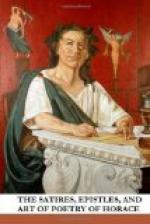Make then an end of getting: know, the more
Your wealth, the less the risk of being poor;
And, having gained the object of your quest,
Begin to slack your efforts and take rest;
Nor act like one Ummidius (never fear,
The tale is short, and ’tis the last you’ll
hear),
So rich, his gold he by the peck would tell,
So mean, the slave that served him dressed as well;
E’en to his dying day he went in dread
Of perishing for simple want of bread,
Till a brave damsel, of Tyndarid line
The true descendant, clove him down the chine.
“What? would you have me live like some we know,
Maenius or Nomentanus?” There you go!
Still in extremes! in bidding you forsake
A miser’s ways, I say not, Be a rake.
‘Twixt Tanais and Visellius’ sire-in-law
A step there is, and broader than a straw.
Yes, there’s a mean in morals: life has
lines,
To north or south of which all virtue pines.
Now to resume our subject: why, I say,
Should each man act the miser in his way,
Still discontented with his natural lot,
Still praising those who have what he has not?
Why should he waste with very spite, to see
His neighbour has a milkier cow than he,
Ne’er think how much he’s richer than
the mass,
But always strive this man or that to pass?
In such a contest, speed we as we may,
There’s some one wealthier ever in the way.
So from their base when vying chariots pour,
Each driver presses on the car before,
Wastes not a thought on rivals overpast,
But leaves them to lag on among the last.
Hence comes it that the man is rarely seen
Who owns that his a happy life has been,
And, thankful for past blessings, with good will
Retires, like one who has enjoyed his fill.
Enough: you’ll think I’ve rifled
the scrutore
Of blind Crispinus, if I prose on more.
SATIRE III.
Omnibus hoc VITIUM.
All singers have a fault: if asked to use
Their talent among friends, they never choose;
Unask’d, they ne’er leave off. Just
such a one
Tigellius was, Sardinia’s famous son.
Caesar, who could have forced him to obey,
By his sire’s friendship and his own might pray,
Yet not draw forth a note: then, if the whim
Took him, he’d troll a Bacchanalian hymn,
From top to bottom of the tetrachord,
Till the last course was set upon the board.
One mass of inconsistence, oft he’d fly
As if the foe were following in full cry,
While oft he’d stalk with a majestic gait,
Like Juno’s priest in ceremonial-state.
Now, he would keep two hundred serving-men,
And now, a bare establishment of ten.
Of kings and tetrarchs with an equal’s air
He’d talk: next day he’d breathe
the hermit’s prayer:
“A table with three legs, a shell to hold
My salt, and clothes, though coarse, to keep out cold.”
Yet give this man, so frugal, so content,
A thousand, in a week ’twould all be spent.
All night he would sit up, all day would snore:
So strange a jumble ne’er was seen before.




